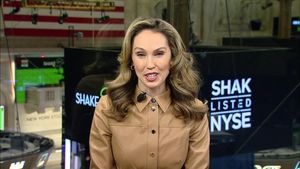Criticism of Kristi Noem has reached new heights after her recent appearance as the Secretary of Homeland Security, where she was seen donning cowboy attire during media interviews conducted from the southern border. This led to sharp criticism on social media, where many users mocked her fashion choices, likening her ensemble to ‘cosplaying’ instead of fulfilling her serious governmental duties. Noem, who formerly served as the Governor of South Dakota and is known for her agricultural background, has adopted a persona during her current role as DHS Secretary, which may be leading to this backlash.
During her interview from the border, Noem stuck to her hardline positions on immigration and the tariffs imposed on Mexico and Canada, claiming these actions would help address the “fentanyl crisis” by targeting nations believed to be contributing to illegal drug trafficking and immigration. “These three nations will feel the pain of tariffs,” she asserted, echoing President Trump’s economic policies criticized for being harsh.
The controversies surrounding Noem’s statements and public image intensified when she suggested during her interview with NBC’s Meet the Press the potential to hold migrants at Guantanamo Bay. Asked by anchor Kristen Welker if families, including children, could be detained at the facility previously known for housing terrorists, Noem declined to rule it out, stating, “We will use the facilities we have.” This remark has taken center stage, igniting debates about human rights and the treatment of migrants.
Some social media users chastised Noem for her appearance, arguing she is more focused on her fashion rather than the real-life issues affecting migrants. Reactions ranged from light-hearted mockery to serious concerns about her effectiveness as DHS head, where users referred to her nicknames such as ‘ICE Barbie’ and ‘American Badass.’ Critics were quick to poke fun at her attire, which included glammed-up hair, makeup, and expensive jewelry, calling her fashion choices ‘ridiculous’ and expressing disbelief at her authoritative portrayal of immigrant issues.
“What is this cosplay she has going on? Kristi Noem hasn't met a hat she won't appropriate,” one commenter stated on social media. Another remarked: “Kristi Noem and her cosplay outfits are completely ridiculous.” The juxtaposition of her hardline policies with her doll-like presentation yielded questions about her sincerity and motivations, particularly as she connects her agricultural roots to her current role.
Noem’s intense focus on immigration and border security coincides with President Trump’s recent imposition of tariffs on several countries. This initiative, framed as necessary to combat the fentanyl epidemic affecting the U.S., had been earlier announced by Trump, who claimed it was imperative for the safety of American citizens. During her time at the southern border, Noem has emphasized her administration's commitment to eradicative approaches, targeting “the worst of the worst,” which grants strong narrative overlap with her flashier public representation.
Her answers about Guantanamo drew backlash, with critics highlighting previous abuses at the facility. While she claims the priority is to remove dangerous criminals from American streets, many argue the conditions of potential detention enclosures will not reflect this sentiment. The skepticism around her statements about using Guantanamo reveals broader concerns about migrant rights and the narrative constructed around immigration enforcement.
Noem’s comments and appearance starkly showcase the conflict between her policies and public persona. By adopting what some have termed ‘cosplay’ for serious discussions around humanitarian issues, she risks alienation from those who may view her policies as draconian or lacking empathy. This echoes broader debates concerning the political representation of women, especially those who may use traditionally masculine symbols, like cowboy hats, for political discourse.
“This whole administration is a fake reality TV show,” one social media critic summarized, capturing the growing sentiment surrounding Noem's public image. Confounding feedback encapsulates the challenges contemporary political figures face, where personal branding and policy overlap, increasingly intersecting with public critique.
Noem’s new role has brought her agricultural background and ‘girl power’ imagery to the forefront. But at what cost? Her cowboy hat, often viewed through the lens of authenticity, faces scrutiny, especially under the harsh light of the bold immigration proposals she supports. The coming weeks will reveal whether this blend of serious policymaking and glam will resonate with the American populace or remain another episode of political theater.



